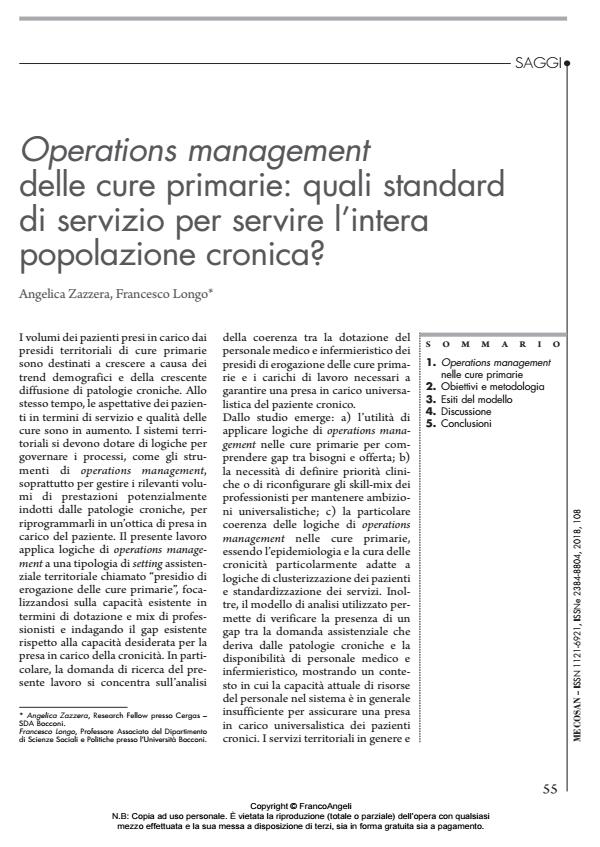Operations management delle cure primarie: quali standard di servizio per servire l’intera popolazione cronica?
Journal title MECOSAN
Author/s Angelica Zazzera, Francesco Longo
Publishing Year 2019 Issue 2018/108
Language Italian Pages 19 P. 55-73 File size 273 KB
DOI 10.3280/MESA2018-108004
DOI is like a bar code for intellectual property: to have more infomation
click here
Below, you can see the article first page
If you want to buy this article in PDF format, you can do it, following the instructions to buy download credits

FrancoAngeli is member of Publishers International Linking Association, Inc (PILA), a not-for-profit association which run the CrossRef service enabling links to and from online scholarly content.
Volumes of patients getting access to primary care services are destined to grow due to demographic trends and to the increase of chronic diseases. At the same time, patients’ expectations in terms of service and quality of care are rising. Health centres must adopt systems to manage processes, such as operations management tools, with the aim of managing high volumes of health services production caused by chronic diseases. These processes should be revised adopting the continuity of care perspective. Our work applies operations management logics to specific healthcare settings that we call "complex primary care unit", focusing on the existing capacity in terms of professionals mix and highlighting the gap between the current capacity and the necessary capacity to assure care to all chronic patients. The research question of our work focuses on the analysis of the coherence between the number of available medical and nursing staff in the primary care setting and the workload necessary to guarantee universalistic care to chronic patients. Our study shows a) the benefit of applying operations management logics to primary care settings to understand gaps between patients’ needs and healthcare system offer; b) the need to define clinical priorities or to reorganize professionals skill-mix in order to keep universalistic ambitions; c) the specific coherence of operations management tools with primary care settings, being epidemiology and chronic care extremely suitable to patients clustering and services standardization. Moreover, the model of analysis of our work enable us to verify the presence of a gap between the care demand coming from chronic diseases and the availability of medical and nursing staff, showing a context where the actual resources capacity is not sufficient to guarantee a universalistic model of care to chronic patients. Health centres in general and primary care settings are far from using operations management logics: through evidences from Emilia-Romagna region, our investigation shows the instrument cost-effectiveness.
Keywords: Primary Care, Operations Management, Health Centre, Outpatient Care, Skill-Mix, Workforce Planning, Capacity Assessment.
- Arbitman D.B. (1986). A primer on patient classification ystems and their relevance to ambulatory care. The Journal of Ambulatory Care Management, 9: 58-81.
- Barsanti S., Bonciani M. (2017) (a cura di). Il Quaderno delle Case della Salute. Firenze: Polistampa.
- Booz & Company Inc. (2011). Ambulatory Operations Improvement Meeting the Demand for High-Quality, Cost-Effective Outpatient Services.
- Cayirli T., Veral E., Rosen H. (2006). Designing appointment scheduling systems for ambulatory care services. Health Care Manag Sci, 9: 47-58,
- Cifalino A., Villa S. (2016). La gestione dei flussi logistici nell’assistenza territoriale: modelli e driver di cambiamento. Mecosan, 99: 9-42. DOI: 10.3280/MESA2016-099002
- Davies C., Walley P. (2000). Clinical governance and operations management methodologies. International Journal of Health Care Quality Assurance, 13(1): 21-26.
- Decreto del Ministero della Salute del 10 luglio 2007, attuativo della Legge 27 dicembre 2006, n. 296.
- Del Vecchio M., Prenestini A., Rappini V. (2014). La riconfigurazione dei piccoli ospedali: un’analisi di casi. In Cergas Bocconi. L’aziendalizzazione della sanità in Italia. Rapporto OASI 2014. Milano: Egea.
- Fenech L., Lega F., Prenestini A. (2017). Il grado di diffusione di una funzione strutturata di gestione operativa nelle aziende sanitarie dell’SSN: un’analisi empirica. In: Cergas Bocconi. L’aziendalizzazione della sanità in Italia. Rapporto OASI 2017. Milano: Egea.
- Fenech L., Lega F., Prenestini A. (2018). L’Operations Management nelle aziende pubbliche del SSN: da work in progress a work on process. In: Cergas Bocconi. L’aziendalizzazione della sanità in Italia. Rapporto OASI 2017. Milano: Egea.
- ISTAT (2017). Annuario Statistico Italiano. Krajewski L.J., Ritzman L.P., Malhotra M.K., Granado A., Secchi R. (a cura di) (2015). Supply chain management. Strategie, processi, performance. Milano: Pearson.
- Langaber J.R. (2008). Health Care Operations Management. Sudbury, Massachusetts: Jones and Bartlett Publishers.
- Morando V., Prenestini A., Rappini V. (2017). Lo sviluppo delle Case della Salute: analisi e riflessioni sui risultati del primo censimento nel Servizio Sanitario Nazionale. In: Cergas Bocconi. L’aziendalizzazione della sanità in Italia. Rapporto OASI 2017. Milano: Egea.
- Santibanez P., Chow V.S., French J., Puterman M.L., Tyldesley S. (2009). Reducing patient wait times and improving resource utilization at British Columbia Cancer Agency’s ambulatory care unit through simulation. Health care management science, 12(4), 392.
- Saltelli A., Chan K., Scott E.M. (Eds.) (2000). Sensitivity analysis (Vol. 1). New York: Wiley. Servizio Assistenza Territoriale Regione Emilia-Romagna (2018). Le Case della Salute in Emilia-Romagna.
- Villa S. (2012). L’operations management a supporto del Sistema di operazioni aziendali. Padova: CEDAM
- Un framework per la digitalizzazione del territorio Francesco Longo, Paola Roberta Boscolo, Claudio Bongiorno Sottoriva, in MECOSAN 122/2022 pp.105
DOI: 10.3280/mesa2022-122oa14872
Angelica Zazzera, Francesco Longo, Operations management delle cure primarie: quali standard di servizio per servire l’intera popolazione cronica? in "MECOSAN" 108/2018, pp 55-73, DOI: 10.3280/MESA2018-108004